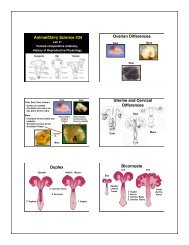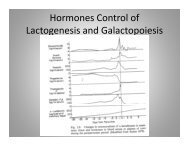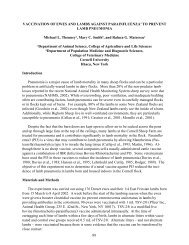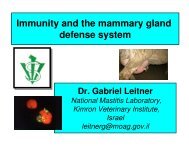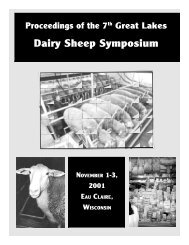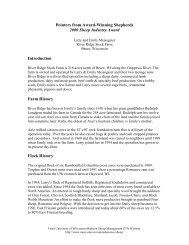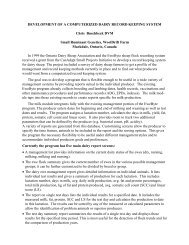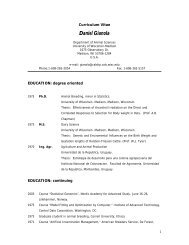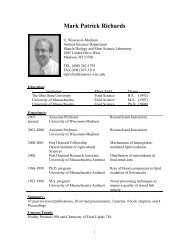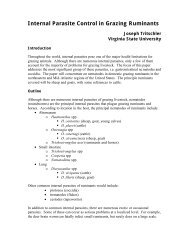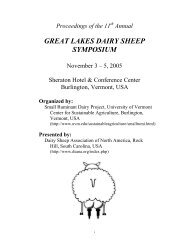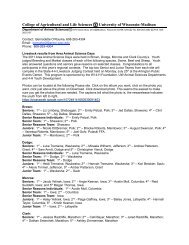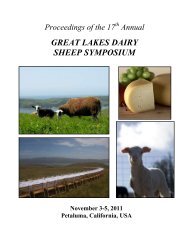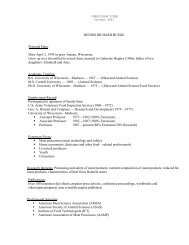great lakes dairy sheep symposium - the Department of Animal ...
great lakes dairy sheep symposium - the Department of Animal ...
great lakes dairy sheep symposium - the Department of Animal ...
Create successful ePaper yourself
Turn your PDF publications into a flip-book with our unique Google optimized e-Paper software.
7. White salt and minerals are allowed, as long as <strong>the</strong>y do not include non-allowed flowing<br />
agents or fillers. (Mineral oil is NOT allowed for internal consumption, yellow prussiate<br />
<strong>of</strong> soda, a common flowing agent, is not allowed).<br />
8. Tail docking and de-horning are allowed.<br />
9. Rams do not need to be managed organically, except during <strong>the</strong> time <strong>the</strong>y are pastured<br />
with ewes.<br />
10. Housing should be well-planned with appropriate air circulation.<br />
11. There is no specification as to <strong>the</strong> timing <strong>of</strong> removing lambs from mo<strong>the</strong>rs. However, any<br />
milk replacer must be produced from only <strong>dairy</strong> products that are from non-rBGH cows.<br />
As <strong>of</strong> fall 2006, <strong>the</strong>re is no allowed milk replacer available. In lieu <strong>of</strong> milk replacer,<br />
organic whole milk must be fed (may be cow, <strong>sheep</strong>, goat).<br />
12. Pure iodine teat dip is allowed, but some dips are restricted.<br />
13. Milk house cleanup is basically <strong>the</strong> same as for non-organic systems, as long as<br />
procedures are installed to ensure pure wash water is <strong>the</strong> last product used before organic<br />
milk contacts a surface.<br />
14. Pest control in barns and milk houses is regulated.<br />
15. Treated wood is not allowed for new construction where <strong>the</strong>re is animal contact. Some<br />
certifiers do allow painted treated wood, check before you use it. Any treated wood in<br />
production systems before organic certification may be grandfa<strong>the</strong>red in. Alternatives<br />
include plastic, cedar, black locust, metal, fiberglass, etc.<br />
16. Comprehensive farm records must be maintained, including individual animal health,<br />
pasture management, and crop production etc. All animals must be somehow identified.<br />
Sample record keeping systems are available.<br />
To sell organic meat (Lamb)<br />
1. To produce an organic lamb for meat, <strong>the</strong> mo<strong>the</strong>r must be treated organically (feed,<br />
pasture, health, etc) for <strong>the</strong> last third <strong>of</strong> gestation (150 days / 3 = 50 days).<br />
2. Mo<strong>the</strong>rs may not be taken in and out <strong>of</strong> organic production.<br />
3. Lambs must be managed organically.<br />
4. Any animal not born <strong>of</strong> an organically managed mo<strong>the</strong>r may never be sold as organic<br />
meat.<br />
Organic Farm Certification<br />
In <strong>the</strong> United States, organic production is, since Oct 2002, regulated by <strong>the</strong> USDA. There is<br />
a 46-page law that describes what is allowed and not allowed in organic production. Canada is in<br />
<strong>the</strong> process <strong>of</strong> defining <strong>the</strong>ir own national organic law. To sell organic products in <strong>the</strong> U.S., you<br />
must abide by <strong>the</strong> regulations outlined by <strong>the</strong> USDA.<br />
Any farm with gross sales <strong>of</strong> organic product over $5,000 per year must be certified by a<br />
third-party organization in order to market organic products. You must also be certified to sell<br />
any ingredient that will be turned into an organic product (such as raw milk made into organic<br />
cheese.)<br />
16



